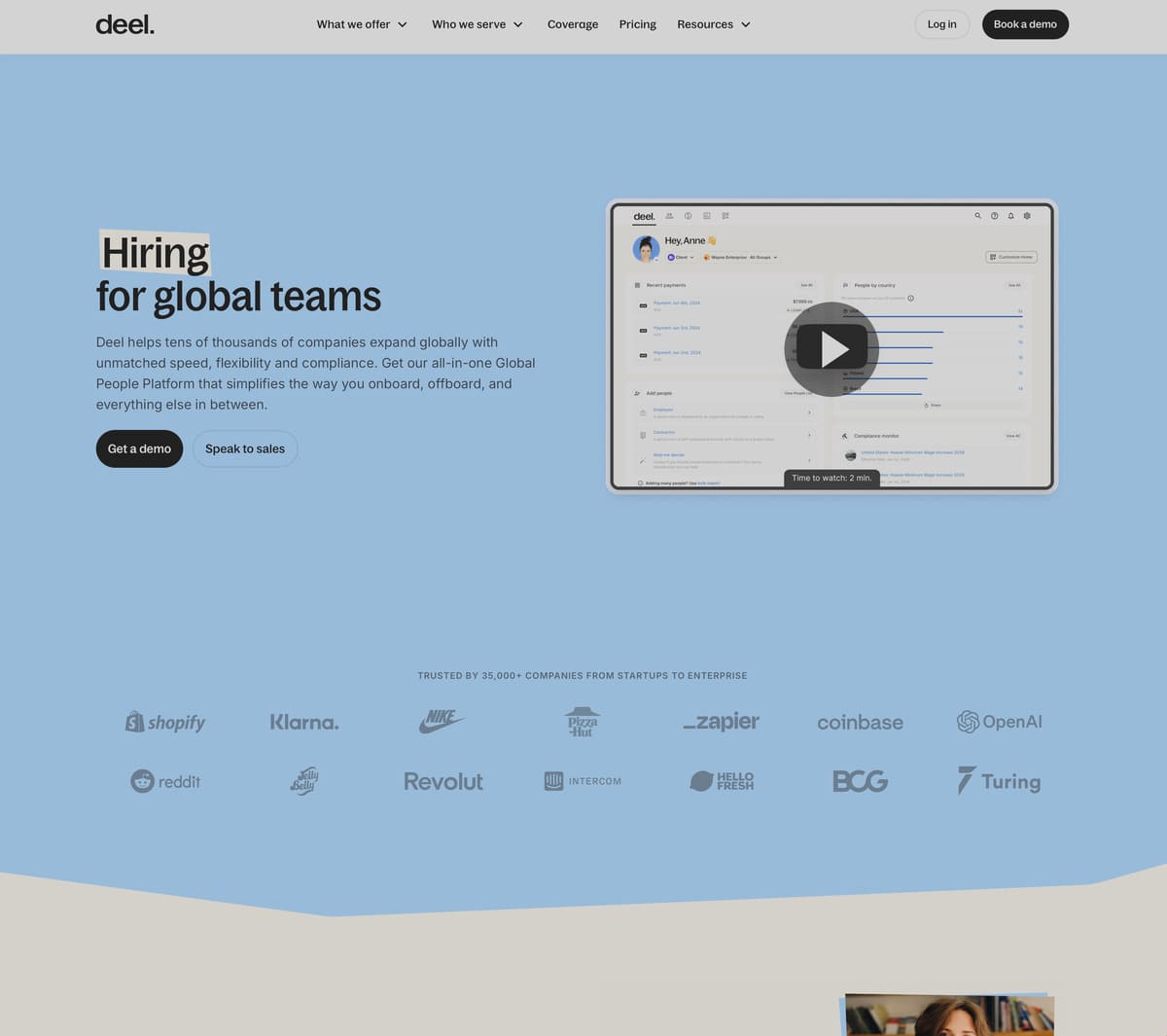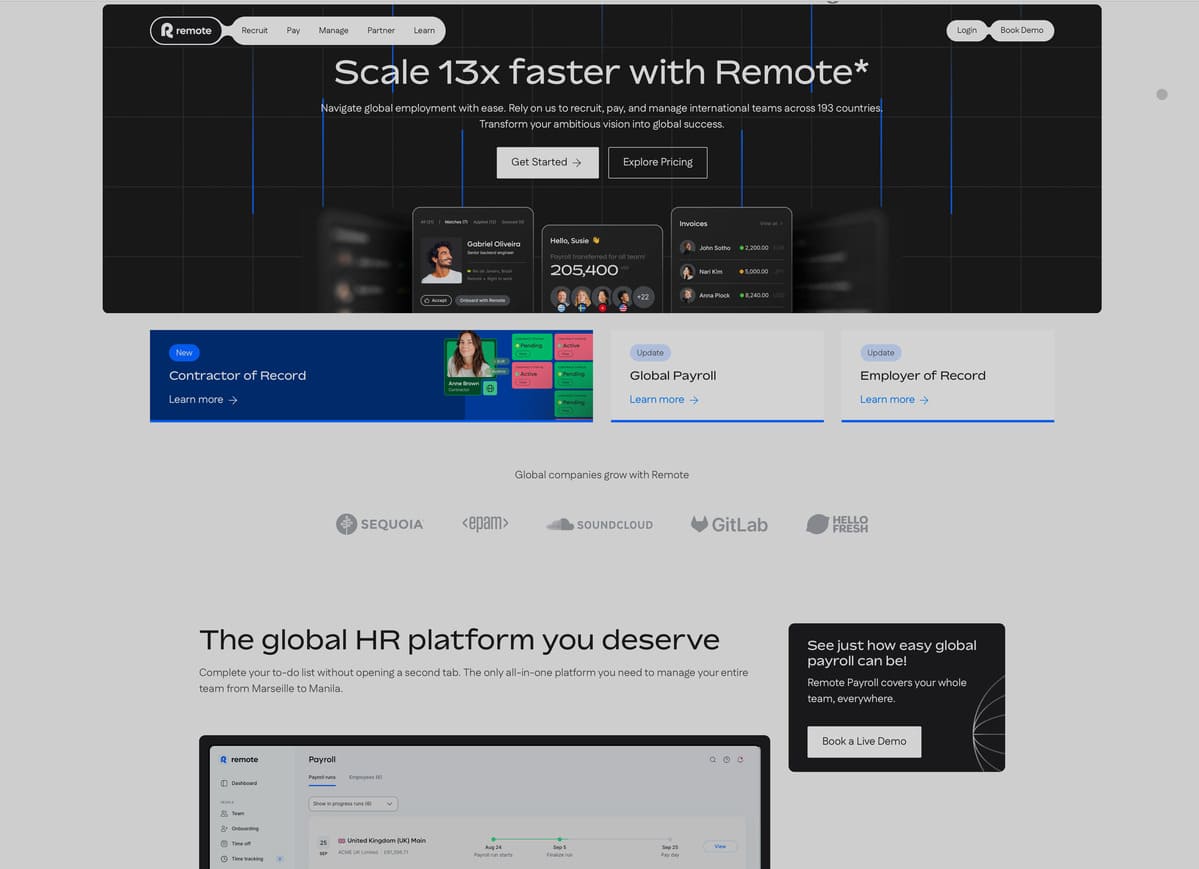Both Deel and Remote are industry-leading platforms designed to simplify global workforce management. Both provide tools for hiring, payroll, compliance, and benefits administration. Deel is known for its wide country coverage and additional financial tools, while Remote places a strong emphasis on ethical employment practices and transparent pricing. Here’s a comprehensive comparison of Deel vs Remote.
Deel vs Remote comparison
| Feature | Deel | Remote |
|---|---|---|
| Hiring Models | Employer of Record (EOR), contractor management, payroll for entities. | Employer of Record (EOR), contractor management. |
| Supported Countries | 150+ countries. | 170+ countries. |
| Compliance Management | Automated contracts, local labour law compliance, and tax filings. | Local legal entities ensure full compliance with labour and tax laws. |
| Payroll Solutions | International payroll for EOR employees, contractors, and local teams. | Global payroll for EOR employees and contractors. |
| Benefits Administration | Comprehensive benefits packages, equity grants, pensions, and insurance. | Competitive benefits, including health insurance, pensions, and equity. |
| Onboarding and Offboarding | Fully digital, automated workflows. | Simplified onboarding with localised processes and compliance. |
| Integrations | Slack, Xero, QuickBooks, BambooHR, and more. | HRIS and ATS integrations (Greenhouse, BambooHR). |
| Support Model | 24/7 multilingual support. | Dedicated account managers and in-country support. |


Pricing comparison
Deel pricing
- Contractor Management: Starts at $49 per contractor/month.
- EOR Services: From $599 per employee/month.
- Custom Plans: Available for enterprises with additional compliance and payroll needs.
- Additional Costs: Optional add-ons for equity management, visa sponsorship, and advanced reporting.
Remote pricing
- Contractor Management: $29 per contractor/month.
- EOR Services: Starts at $599 per employee/month.
- Startup Discounts: Special pricing for early-stage companies.
- Additional Costs: Optional benefits packages and payroll add-ons.
Strengths and weaknesses
Deel
Strengths:
- Vast country coverage (150+ nations).
- Comprehensive equity management tools for startups and enterprises.
- Advanced reporting features for HR and finance.
Weaknesses:
- Higher pricing for smaller businesses.
- Some users report complexity in advanced tools.
Remote
Strengths:
- Ethical employment practices and localised legal entities in 170+ countries.
- Transparent pricing with fewer hidden costs.
- Strong focus on simplicity for startups and small businesses.
Weaknesses:
- Less robust integration ecosystem compared to Deel.
- Fewer advanced features for financial and equity management.
Suitability by business size
| Business Size | Deel | Remote |
|---|---|---|
| Small Businesses | Suitable but can be expensive; ideal for those scaling rapidly. | Highly suitable due to affordable, transparent pricing for EOR and contractors. |
| Medium Businesses | Great for managing large, distributed teams and offering equity packages. | Excellent for simplifying compliance and payroll without added complexity. |
| Large Enterprises | Perfect for enterprises needing advanced reporting, compliance, and integrations. | Suitable for enterprises focused on ethical employment and streamlined processes. |
Key differentiators
Deel USPs
- Known for advanced compliance and financial tools.
- Provides detailed equity management solutions.
Remote USPs
- Operates through its own local legal entities, ensuring robust compliance.
- Offers transparent pricing and ethical employment practices.
FAQ – Deel vs Remote
Deel uses automated compliance tools to manage contracts and tax filings across 150+ countries. Remote operates its own legal entities in 170+ countries to ensure full compliance with local labour laws.
Remote provides more affordable options for small businesses, with a $29/month rate for contractor management and transparent pricing for EOR. Deel’s pricing is higher but includes more advanced financial tools.
Deel has comprehensive equity management tools, allowing businesses to manage stock options globally. Remote also supports equity but focuses more on compliance and simplicity rather than advanced features.
Deel offers visa sponsorship as an optional service for businesses hiring internationally. Remote does not directly provide visa sponsorship but offers guidance on managing international talent.
Remote’s startup-friendly pricing and simple workflows make it ideal for early-stage companies. Deel, while more expensive, is suitable for startups planning rapid global expansion and requiring advanced tools.
Both platforms offer localised benefits packages, but Deel’s range includes equity grants and pension schemes. Remote focuses on providing competitive health insurance and retirement plans tailored to local markets.
Remote supports 170+ countries through its own legal entities, giving it a slight edge in coverage. Deel operates in 150+ countries but compensates with extensive automation and integrations.



